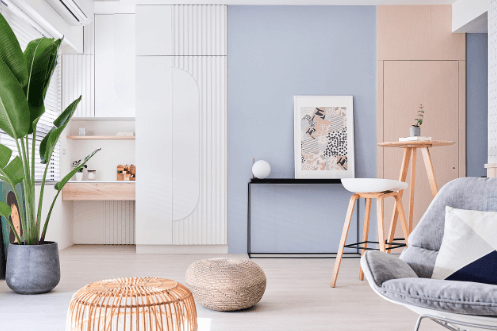Embarking on a journey in interior design can be exciting and daunting at the same time. Whether you’re a budding designer looking to make a mark or a seasoned enthusiast aiming to formalise your skills, choosing suitable interior design courses is crucial for your development. This blog aims to help you navigate the scope of interior design education, from beginner basics to expert intricacies.
Know Your Goals and Preferences
Before focusing on course selections, it’s important to understand what you aim to achieve with your studies. Are you looking to turn this into a full-time career, or is this a passion project to enhance your space? Understanding your objectives will guide you in deciding how much time and effort to invest and which courses will best meet your needs.
Career Aspirations
If you’re aiming for a professional career, accredited programs that offer a comprehensive curriculum covering design principles, space planning, materials, and project management are your best bet. Look for programs that also provide practical experience through internships or hands-on projects.
Hobbyist Approach
Short courses or workshops focusing on specific areas, such as colour theory, furniture arrangement, or DIY decor, could be more appropriate and enjoyable for those exploring it as a hobby.
Starting with the Basics
For beginners, the foundation of any suitable education starts with understanding the basics. Look for programs that cover:
Design Principles
Learn about balance, harmony, rhythm, and proportion, which are the backbone of good design. A course that starts with these fundamentals will provide a solid base to build.
Colour Theory
Understanding how colours interact and affect spaces is crucial. Programs that offer an in-depth look at colour psychology and application can enhance your ability to create compelling designs.
Software Skills
Nowadays, proficiency in design software is invaluable. Beginners should consider introductory courses in these tools to enhance their technical skills.
Intermediate Courses: Deepening Your Knowledge
Once you have the basics down, intermediate courses can help you specialise and refine your skills. These programs often require some prior knowledge and focus on more complex concepts.
Space Planning
This is essential for functional, efficient layouts. Courses focusing on space planning will teach you how to effectively use space and create flow within interiors.
Sustainable Design
As sustainability becomes increasingly important, understanding how to incorporate eco-friendly practices into your designs can set you apart. Look for the ones that focus on sustainable materials and energy-efficient design.
Historical Perspectives
Understanding various historical styles gives you a broader toolkit to draw. These programs can inspire and inform your aesthetic.
Advanced Courses: Becoming an Expert
Advanced programs that challenge conventional thinking and encourage innovation are essential for those looking to reach the top of the field.
Specialised Design Areas
Consider specialising in areas like lighting design, acoustics, or ergonomics. Advanced courses in these niches can make you a highly sought-after expert.
Project Management
Learning to manage budgets, timelines, and client relationships is crucial for success in the professional field. Advanced programs often include project management skills tailored to the creative industries.
Thesis Projects
Some advanced programs offer the opportunity to work on a thesis project, which can be a great way to explore a topic that interests you while also building a professional portfolio.
Choosing the Right Learning Platform
With the proliferation of online learning, you have more options than ever. Consider the following when choosing the platform:
Accreditation and Credibility
Ensure the institution offering the course is accredited and respected in the industry. This can impact your job prospects and professional growth. Accreditation by recognised authorities ensures that the educational program meets specific quality standards. This guarantees that the curriculum is up-to-date, comprehensive, and relevant to the current demands of the industry. Accredited programs are evaluated on their faculty qualifications, educational resources, and the success of their graduates, among other factors.
Flexibility
Online courses offer flexibility that is especially valuable if you are balancing learning with other commitments. However, if hands-on learning and face-to-face interaction are essential to you, look for hybrid or in-person options. Online programs allow you to access learning materials at any time and from anywhere, making it possible to fit education into a busy schedule without compromising on the quality of the teaching. Many online platforms also offer modular programs that can be taken at your own pace, which is beneficial for deeper comprehension and personal time management.
Community and Networking
Some platforms offer vibrant communities to connect with fellow students and professionals. This network can prove to be incredibly valuable as you advance in your career. Being part of an active community allows you to exchange ideas, seek feedback, and share resources with peers passionate about the field. This collaborative environment can lead to a deeper understanding and more innovative approaches to different challenges.
Choosing suitable interior design courses involves clearly understanding your goals, starting with foundational knowledge and progressively deepening your expertise. By choosing programs that match your career goals and personal learning style, you can set yourself up for a fulfilling and successful career in the field.


